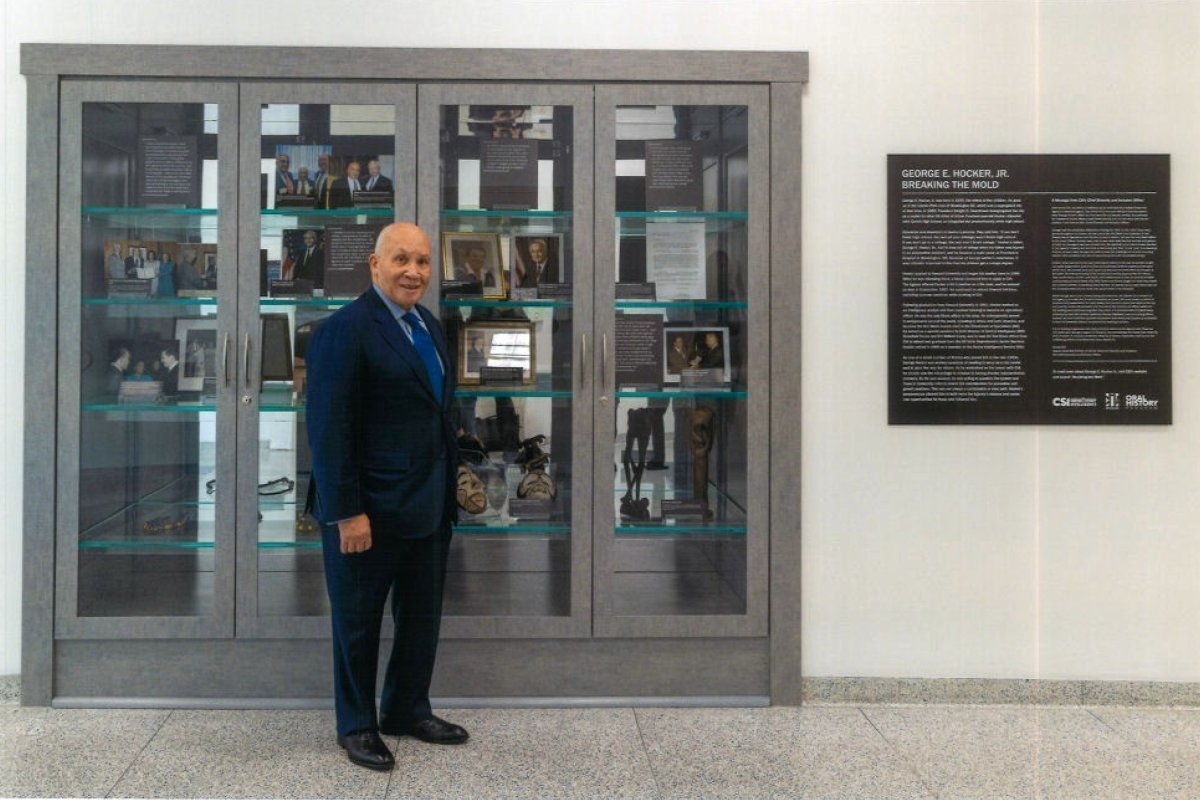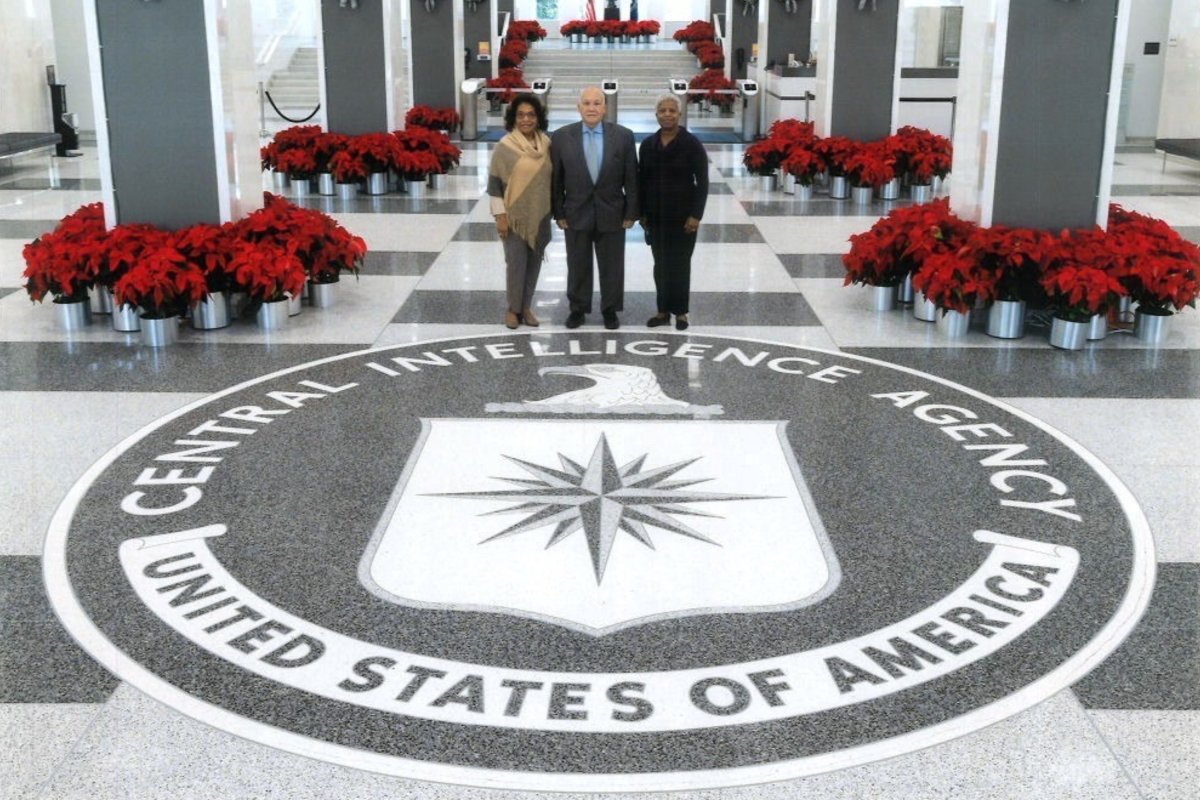When the CIA told me it was creating an exhibit about me for its venerated museum at headquarters in Langley—its first exhibit ever about a Black American spy—I was stunned.
Having grown up in Washington, DC, so poor that my family could not even afford long pants for me in the winter, I never imagined that our nation would one day call me a "trailblazer." Now, as I walk through the exhibit, I'm brought to tears.
It describes me as having "had the precarious distinction of being the first or the only at so many points throughout his career," including being the first Black person to open a CIA station.
"At every step, George was able to meet the challenge of not only executing mission with excellence, but also overcoming bias with remarkable energy... In breaking down artificial barriers, he opened up so many doors both for his contemporaries and for those who would follow in his footsteps."
As though the exhibit was not honor enough, I was also given the Salvetti Award from the CIA Retirees Association. At a celebration, speakers credited me with going against the agency's tradition of hiring "pale, male and Yale."

But to me, what matters most is that the CIA has now made it possible for me to share my experiences, and what they've taught me about America, the world, and humanity.
I joined the CIA in 1957 as a file clerk to make money to help pay for my education at Howard University. Higher ups told me that I'd never become a spy because Black people were not intelligent enough and could not "blend in" anywhere. I believed it.
At the March on Washington in 1963, that changed. Standing only 100 yards from Dr. Martin Luther King, Jr. as he described his now famous "dream," I had a revelation. It felt like a wave of self-discovery coursed through my body.
I realized that I did not have to give in to racists. I determined I would become a spy.
It took years of trying much harder than many of my white colleagues, constantly proving my abilities and demanding opportunities. Finally, I managed to work my way up the ranks.
The Cold War was entering full swing, and the United States was locked in a battle with Russia for global dominance. Nowhere was this clearer than in Africa, where I was sent to collect secrets and carry out operations.
Despite some racist bosses who tried to set me up to fail, I didn't give up. And I was given the chance to not only spy but oversee a team (making me a "spymaster" by definition).
I spent years doing the kind of clandestine work you might imagine—developing sources, sneaking into and out of buildings, planting and collecting bugs—and some kinds that you may never have heard of.
Once, I orchestrated the exfiltration of a KGB defector who had special knowledge. I tracked him down along dirt roads in the darkness of night while avoiding police, and smuggled him and a U.S. team to a hidden strip of land to get him airlifted out of Africa at daybreak.
After Africa, I was sent to Latin America, where the battle against U.S. adversaries for political dominance and the battle against narco-terrorists created a toxic, dangerous environment that constantly put our lives in danger. Bombings and threats were a daily occurrence.
It was never lost on me that, while I was fighting for my country's interests in some of the world's most dangerous regions, my fellow Black Americans were facing war zones of their own at home. The battle for civil rights and freedoms was often bloody.
The same government that counted on me was doing awful things that directly impacted my friends and family. I myself had been brutalized by police as a teenager. I knew the pain of being Black in America.
Many Black patriots have faced that contradiction. James Lafayette, an enslaved man, spied for America in the Revolutionary War. Harriet Tubman, a conductor on the Underground Railroad, spied for the Union during the Civil War. Spying for the United States doesn't mean agreeing with everything it does; it means being part of the effort to protect the nation and make it better.
Eventually, I was put in charge of intelligence gathering on Soviet and East European operations in Latin America, and then appointed as the first Black person to serve as Special Assistant to two CIA Directors, Admiral Stansfield Turner under President Jimmy Carter and Bill Casey under President Ronald Reagan.
Finally, I became the agency's first Senior Advisor to the Drug Enforcement Administration in the Counternarcotics Center as part of President George H.W. Bush's "War on Drugs."

My belief in God fueled me throughout my 34 years in the CIA. So perhaps it's no surprise that, after retiring from public service and spending several years in private business, I became pastor of a 800-member Christian church in Oregon.
I then became a public advocate, working to help young people get jobs. I managed to help organize an event at the White House in which President Barack Obama honored Black American World War I hero Henry Johnson.
Now, I'm enjoying life with my amazing wife Marcia Hocker, herself a former beauty queen. I'm recording my memories and experiences, excited to tell the stories of what my life has entailed—and hoping to help show anyone, from any background, that they can achieve what other people tell them is out of reach.
George E. Hocker, Jr., is working on an autobiography with co-author Josh Levs and Roger Freet of Folio Literary Management.
All views expressed are the author's own.
Do you have a unique experience or personal story to share? Email the My Turn team at myturn@newsweek.com.
Uncommon Knowledge
Newsweek is committed to challenging conventional wisdom and finding connections in the search for common ground.
Newsweek is committed to challenging conventional wisdom and finding connections in the search for common ground.
About the writer
George E. Hocker, Jr., is a former CIA spymaster. He is working on an autobiography with co-author Josh Levs and ... Read more
To read how Newsweek uses AI as a newsroom tool, Click here.








